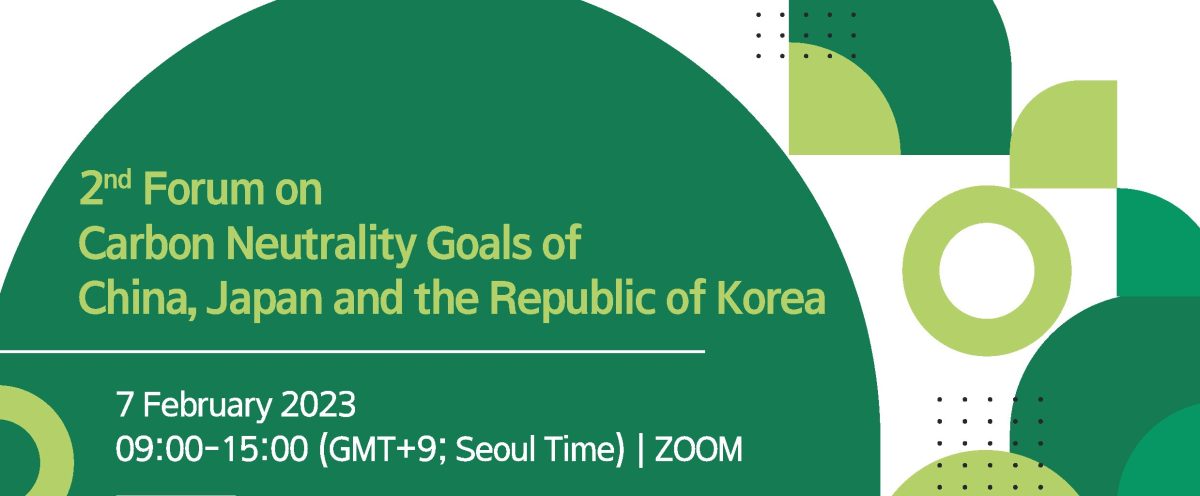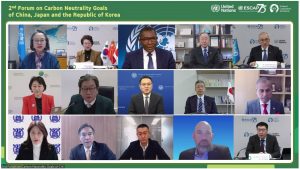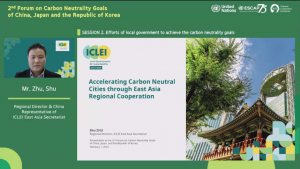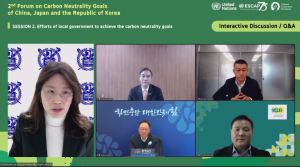ICLEI East Asia: Raising Local ambitions for Carbon neutral cities in the region

The Second Forum on Carbon Neutrality Goals of China, Japan and Republic of Korea took place virtually on February 7, 2023. The forum was jointly organized by United Nations Economic and Social Commission for Asia and the Pacific (UNESCAP), the Trilateral Cooperation Secretariat (TCS), and the Climate Action Team of Executive Office of the United Nations Secretary-General (EOSG/CAT). ICLEI East Asia joined the forum and urged regional stakeholders to create momentum for concrete local actions towards carbon neutrality.
The forum aimed to accelerate multilevel and cooperative actions in the East Asia region to achieve carbon neutrality aligned with global climate actions revolving around the leadership of the UNFCCC. Back in November 2022, in Sharm el-Sheikh in Egypt, the parties of the UNFCCC reiterated the climate emergency and called for bold, strong, cohesive climate actions than ever before to achieve goals of the Paris Agreement. The UNFCCC COP27 marked a milestone in adopting the establishment of Loss and Damage funds to better support the climate adaptation capacity of developing countries by putting climate finance at the center stage in negotiations. It also highlighted the urgent need for multilevel and cooperative actions to combat climate change in a cohesive and effective manner.

group photos of participants (source: Trilateral Cooperation Secretariat)
The forum provided a great opportunity to bring the carbon neutrality goals and climate actions to the attention of stakeholders in East Asia region and to accelerate the transition into a low carbon and resilient region. National and local governments, policy practitioners, international and regional organizations, and relevant stakeholders from and beyond the region convened to share their insights, knowledge, and best practices to address climate change. They further reiterated the importance of regional collaboration to take effective and coordinative measures to achieve the common goals.
The forum consisted of three sessions. At the first session, high-level officials from the national governments of the three countries introduced the national frameworks for achieving carbon neutrality by 2050 or 2060, and the progress made so far. The second session focused on local governments’ efforts to achieve carbon neutrality. Experts from the energy and transportation sectors explored sectoral efforts towards climate neutrality at the third session.
In particular, Session 2 provided a valuable opportunity to examine how the local governments translate their political commitments into policy-based practices and address challenges and opportunities. Shu Zhu, Regional Director and China Representative of ICLEI East Asia Secretariat, engaged in providing a rich and fruitful session with the leaders from Nagano Prefecture, Sino-Singapore Tianjin Eco-city, and Chungcheongnam-do. The session helped to deep dive into the initiatives of Nagano Prefecture’s to transform into a sustainable decarbonized society, the case of Sino-Singapore Tianjin Eco-city on its path towards carbon neutrality, and the net-zero strategies and actions of Chungcheongnam-do. Shu Zhu shared his practical insights on the local actions of three countries to achieve carbon neutrality goals.

Shu Zhu, Regional Director and China Representative of ICLEI East Asia, presented at the forum

Shu Zhu joined a panel discussion with leaders from local governments in the three countries
Underscoring the crucial role of cities in responding to the climate emergency and achieving climate neutrality, Shu Zhu called for the establishment of a formal mechanism for local governments in the three countries to enhance their capacity to take climate actions and strengthen cooperation between cities. Such a mechanism can accelerate East Asian cities’ journey toward carbon neutrality.
More details are available at https://www.unescap.org/events/2023/2nd-forum-carbon-neutrality-goals-china-japan-and-republic-korea.
Authors: Yeajee Kim (yeajee.kim@iclei.org), Xuan Xie (xuan.xie@iclei.org)

